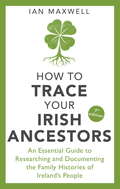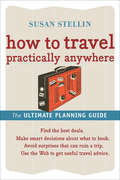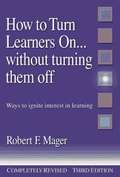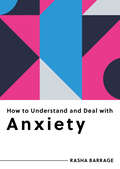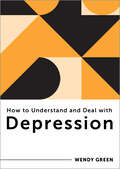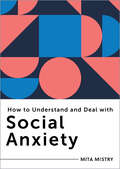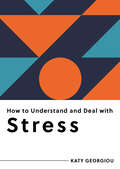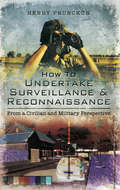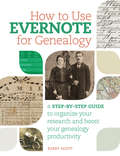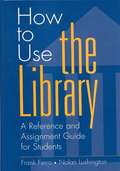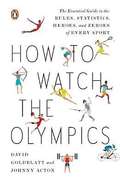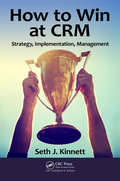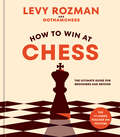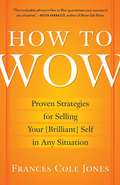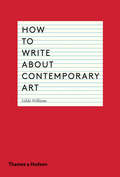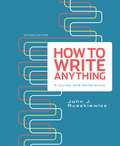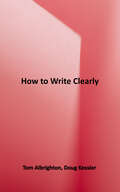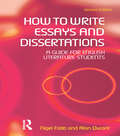- Table View
- List View
How to Trace Your Irish Ancestors 3rd Edition: An Essential Guide to Researching and Documenting the Family Histories of Ireland's People
by Ian MaxwellWhether you're eager to hold on to EU citizenship post-Brexit or simply interested in exploring your family's past, learn how to research and document your Irish ancestry with this essential guide, newly updated to include the latest genealogy tools.The purpose of this book is to highlight the most important documentary evidence available to the family historian wishing to research their Irish ancestry. It is aimed primarily at researchers whose time in Irish repositories is limited, and who want to know what is available locally and online. It covers more than eighteen individual sources of information, making it simpler to organise your search and easier to carry it out both locally and on the ground.This books covers:- Where to begin- Researching online- Civil registration- Making sense of census returns, wills, election records- Migration, emigration- Local government and church records
How to Train Your Dog: A Relationship-Based Approach for a Well-Behaved Dog
by Liz Palika Kate AbbottBond with your canine friend and learn how to train the dog that's in front of you with relationship-based methods. It's the easiest and most effective way to get happy, noticeable results.Your dog is your faithful friend, and they're happiest when they're by your side. But without some basic training, a dog can turn your life—and your house!—upside down. Chock-full of clear and easy-to-follow training tips and helpful color photos to illustrate, this guide will make you and your dog the best-behaved pair at the dog park! In this book, you get:Simple suggestions on establishing and strengthening your bond with your dog.A look at the collars, leashes, toys, treats, and other teaching tools you need.Terrific tips for keeping your training sessions exciting and upbeat so you both enjoy them.Easy lessons on housetraining and teaching basic commands, like sit, stay, and come.Pointers on using the positive lure-and-reward method to correct problem behaviors.Fun tutorials for teaching your dog tricks, retrieving games, agility, and more!
How to Train Your Dog: Transform Your Dog's Behavior and Strengthen Your Bond Forever A Dog Training Book
by Adam SpiveyEverything you need to know to tackle your dog&’s behavioral issues and understand how your dog thinks, from the trainer behind social media sensation Southend Dog TrainingDo you wish you could get your dog to behave better? Southend Dog Training founder Adam Spivey can help. In this indispensable book, he helps you build a better connection with your dog at any age and solve any behavioral issues with simple, proven training techniques. He won&’t just tell you what to do to get your dog to listen to your commands; he will also help you to understand how your dog thinks and why they might be struggling with certain things. How to Train Your Dog will help you and your dog with• Leash training, recall, and reactivity when you&’re both out and about• Jumping, excessive barking, and reactions to the TV or doorbell• Dos and don&’ts for households with children and/or multiple dogs• Chewing, biting, and destructive behavior Whether your dog is old or young, from a breeder or is a rescue, and has big or small issues, Adam&’s inimitable straight-talking approach will get you to a better place with your best friend.
How to Travel Practically Anywhere: The Ultimate Planning Guide
by Susan StellinAn essential guide for today's traveler: timesaving tips to navigate, book, and troubleshoot your travel planning, on and off the Web.If you've ever tried to find a sale fare you saw advertised for a flight, only to turn up much higher prices, or discovered that the hotel you booked wasn't exactly "steps away from the ocean," you know that the do-it-yourself era of travel can mean something else entirely: you're on your own.Now Susan Stellin, a regular contributor to the New York Times, offers the ultimate guide to the sometimes overwhelming logistics of travel, from researching trip plans to avoiding pitfalls on the road. This comprehensive guidebook presents practical advice on the most useful Web sites, strategies for finding the best deals, and resources to help you decide where and when to go. It also provides crucial tips to ensure your trip doesn't disappoint, including- what you should research before you book your hotel - how to avoid hidden fees and expensive change penalties - what your credit card covers when you rent a car - whom to call if you need a doctor far from homeNo matter what type of trip you're planning -- business or pleasure, domestic or international, budget or splurge, exotic getaway or family visit -- How to Travel Practically Anywhere will be an indispensable resource.
How to Travel the World on $75 a Day: Travel Cheaper, Longer, Smarter
by Matt KepnesYou don&’t need to spend a ton of money to have life-changing travel experiences.Every day, more and more people long for vacations that go beyond packaged tours and overpriced hotels. They want unforgettable adventures. Travel expert Matt Kepnes has been traveling the world since 2006 and has shared his expertise and insights with countless globe-trotters on his blog and in print. In this new, updated edition of How to Travel the World, you&’ll be able to benefit from practical, detailed, exhaustively researched travel advice that will help you get on the road better, cheaper, and smarter. Pack your bags as he shares: Step-by-step instructions for planning your dream trip Money-saving tips and travel hacks to make the most of your budget and avoid overpaying Expert recommendations for getting off the beaten path so you can really see and understand the places and people you visit Detailed guidance on everything from packing lists to vaccinations to travel companies, as well as region-specific advice for accommodations, transportation, activities, and more Bursting with tons of new material and vetted by the author&’s own experiences, How to Travel the World on $75 a Day provides all the info you need to organize and implement the trips you&’ve always fantasized about . . . without breaking the bank.
How to Turn Learners On... Without Turning Them Off: Ways to Ignite Interest in Learning
by Robert Mager<p>How to Turn Learners On gives you the power to increase student motivation and develop positive attitudes in your learners. You'll learn to: <p> <li>Minimize actions that result in negative attitudes toward a subject <li>Maximize actions that make students enjoy learning <li>Model the performances you want to result from instruction so students can learn by example <li>Get learners excited about what you are teaching <li>Make them eager to learn more <li>Reduce frustration and prevent learners from giving up</li> </p>
How to Understand and Deal with Anxiety: Everything You Need to Know (How to Understand and Deal with...Series #0)
by Rasha BarrageA practical, supportive, and easy-to-read guide to help you understand and overcome anxiety, filled with helpful tips and actionable advice Feeling overwhelmed? This little book is here to help. How to Understand and Deal with Anxiety is a friendly, accessible guide with all the information and advice you need to identify the source of your struggles and take practical steps to reduce or manage the burden of your symptoms. By learning the science behind anxiety and understanding how it affects your mind and body, you'll start to dismantle its hold on you. And with practical ways to manage the condition—including physical, medical, and therapeutic perspectives—this book will help you support your mental health and improve your overall wellbeing. After reading this book, you will: Understand the science behind anxiety, how it manifests, what causes it, and how to identify symptoms and triggers Be armed with practical steps you can take to alleviate anxiety, from breathing exercises and healthy lifestyle choices to problem-solving techniques and coping mechanisms Have a host of holistic remedies up your sleeve for when anxiety strikes, such as mindfulness, visualization, and breathwork Know about the medical treatments and therapies available, and know how and when to seek professional help or support With the right knowledge and guidance, you can learn to understand and manage anxiety so that you can get back to feeling like yourself again.
How to Understand and Deal with Depression: Everything You Need to Know (How to Understand and Deal with...Series #0)
by Wendy GreenA practical, supportive, and easy-to-read guide to help you understand and overcome depression, filled with helpful tips and actionable advice Feeling overwhelmed? This little book is here to help. How to Understand and Deal with Depression is a friendly, accessible guide with all the information and advice you need to identify the source of your struggles and take practical steps to reduce or manage the burden of your symptoms. By learning the science behind depression and understanding how it affects your mind and body, you'll start to dismantle its hold on you. And with practical ways to manage the condition—including physical, medical, and therapeutic perspectives—this book will help you support your mental health and improve your overall wellbeing. After reading this book, you will: Understand the science behind depression, how it manifests, what causes it, and how to identify symptoms and triggers Be armed with practical steps you can take to alleviate the symptoms of depression, from breathing exercises and healthy lifestyle choices to problem-solving techniques and coping mechanisms Have a host of holistic remedies up your sleeve for when depression strikes, such as mindfulness, visualization, and breathwork Know about the medical treatments and therapies available, and know how and when to seek professional help or support With the right knowledge and guidance, you can learn to understand and manage depression so that you can get back to feeling like yourself again.
How to Understand and Deal with Social Anxiety: Everything You Need to Know (How to Understand and Deal with...Series #0)
by Mita MistraA practical, supportive, and easy-to-read guide to help you understand and overcome social anxiety, filled with helpful tips and actionable advice Feeling overwhelmed? This little book is here to help. How to Understand and Deal with Social Anxiety is a friendly, accessible guide with all the information and advice you need to identify the source of your struggles and take practical steps to reduce or manage the burden of your symptoms. By learning the science behind social anxiety and understanding how it affects your mind and body, you'll start to dismantle its hold on you. And with practical ways to manage the condition—including physical, medical, and therapeutic perspectives—this book will help you support your mental health and improve your overall wellbeing. After reading this book, you will: Understand the science behind social anxiety, how it manifests, what causes it, and how to identify symptoms and triggers Be armed with physical and practical steps you can take to alleviate the symptoms of social anxiety, from breathing exercises and healthy lifestyle choices to problem-solving techniques and coping mechanisms Have a host of holistic remedies up your sleeve for when social anxiety strikes, such as mindfulness, visualization, and breathwork Know about the medical treatments and therapies available, and know how and when to seek professional help or support With the right knowledge and guidance, you can learn to understand and manage social anxiety so that you can get back to feeling like yourself again.
How to Understand and Deal with Stress: Everything You Need to Know (How to Understand and Deal with...Series #0)
by Katy GeorgiouA practical, supportive, and easy-to-read guide to help you understand and overcome stress, filled with helpful tips and actionable advice Feeling overwhelmed? This little book is here to help. How to Understand and Deal with Stress is a friendly, accessible guide with all the information and advice you need to identify the source of your struggles and take practical steps to reduce or manage the burden. By learning the science behind stress and understanding how it affects your mind and body, you'll start to dismantle its hold on you. And with practical ways to manage stress—including physical, medical, and therapeutic perspectives—this book will help you support your mental health and improve your overall wellbeing. After reading this book, you will: Understand the science behind stress, how it manifests, what causes it, and how to identify symptoms and triggers Be armed with physical and practical steps you can take to alleviate stress, from breathing exercises and healthy lifestyle choices to problem-solving techniques and coping mechanisms Have a host of holistic remedies up your sleeve for when stress strikes, such as mindfulness, visualization, and breathwork Know about the medical treatments and therapies available, and know how and when to seek professional help or support With the right knowledge and guidance, you can learn to understand and manage stress so that you can get back to feeling like yourself again.
How to Undertake Surveillance & Reconnaissance: From a Civilian and Military Perspective
by Henry PrunckunThis comprehensive primer explains how to conduct your own recon operations, covering tactics, equipment, and counter-reconnaissance.How to Undertake Surveillance and Reconnaissance offers a detailed overview of surveillance and reconnaissance work. In doing so, it shows readers how to employ the unique trade craft in order to help you plan and carry out your own recon missions. Author and former government intelligence worker Dr. Henry Prunkun explains the background of surveillance and reconnaissance, why they are necessary, and how they can be effectively employed. He also covers the essential equipment and training necessary to carry out a successful mission. Readers also learn how to counter opposing reconnaissance efforts. Each chapter of this well referenced and thoroughly indexed book contains a list of key words and phrases, study questions, and a few learning activities that will assist you with your study.
How to Use Evernote for Genealogy: A Step-by-Step Guide to Organize Your Research and Boost Your Genealogy Producti vity
by Kerry ScottMaximize Your Research Progress!Harness the powerful, timesaving organization features of Evernote's free software and mobile apps to manage your genealogy research. This comprehensive user guide explains how to organize all kinds of genealogy clues--from notes and e-mails to vital records and audio files--so the information is easily searchable, accessible on any device, and automatically backed up in the cloud. Step-by-step instructions show you how to file research materials, analyze research clues, collaborate with cousins, and share your family history.In this book, you'll findEvernote tips and strategies specifically for genealogy researchers, with real-life examplesStep-by-step instructions for managing different types of genealogy information, from research notes to document images to web clippingsTricks for using Evernote to speed up research tasks, including transcription and research logsSuggestions to search-optimize your Evernote data so your information is easy to findIdeas for enhancing Evernote with external appsTips to protect your data and troubleshoot common issuesWorksheets to help you organize your notebooks and stacksWhether you're an Evernote newbie or dedicated user, How to Use Evernote for Genealogy will change your research life by showing you how this free tool can make you a better, more efficient genealogist.
How to Use an Interactive Whiteboard Really Effectively in Your Primary Classroom
by Jenny GageThis book helps teachers get to grips with using software and offers advice on the different classroom management, differentiation and learning styles issues involved in using a whiteboard in a classroom context by:* Covering issues specific to Primary school teachers integrating whiteboard teaching into their classrooms* Providing cross-curricular strategies that help teachers incorporate the board in a range of subjects* Including screenshots and photos that show what can be created and how to do it* Offering innovative ways of presenting curriculum topics* Including downloadable resources packed full of resources that teachers can develop for their own use.
How to Use eBay and PayPal
by Todd AlexanderToday, eBay is the biggest online retail shopping site packed with unbeatable bargains. Whether you use eBay every day or have never used it before, this easy-to-follow guide is updated to include the latest changes to eBay and PayPal. In this edition Australia?s leading eBay expert shows you how to: * Search eBay quickly and efficiently for the lowest prices, brand new items and the best global deals on the internet * Pay securely using PayPal without sharing your financial information * Use your mobile to search, buy and pay for items online ? anytime, anywhere * Sell your unwanted household items for cash ? use the money to buy what you really want * Stay safe online and avoid scams * Quickly and easily find help HOW TO USE EBAY AND PAYPAL is the only official pocket guide available, written by an eBay employee with more than nine years? experience.
How to Use the Library: A Reference and Assignment Guide for Students
by Frank Ferro Nolan LushingtonAddressing secondary school students, Ferro (Connecticut Public Library) and Lushington (library science, Southern Connecticut State U.) overview how a library is organized, how to locate materials and conduct research using electronic as well as traditional media. Features an annotated list of standard resources by topic area, a keyword index to link references with homework assignments, and appendixes on the Dewey Decimal and Library of Congress classification systems. Annotation c. by Book News, Inc., Portland, Or.
How to Watch Soccer
by Ruud GullitAn opinionated masterclass in the art and science of “reading” a match from one of professional soccer’s most respected and beloved international figures <P><P>Ruud Gullit knows better than anyone else that to understand soccer you have to understand strategy. When he started playing soccer, his only “strategy” was to get the ball, outrun everyone else to the other end of the field, and score. At first it served him well, but as he advanced through the sport, he learned that it takes much more than speed to make a winning team. He worked his way from the Dutch junior leagues all the way to the legendary AC Milan, eventually retiring from the field to be a trainer, then a manager, and finally a commentator. <P>Each step came with its own lessons, and its own unique perspective on the game. Having looked at soccer through just about every lens possible, Gullit is now sharing his own perspective. Most spectators simply watch the ball, but in How to Watch Soccer, Gullit explains how to watch the whole game. He shows how every part of a match, from formations to corner kicks, all the way down to what the players do to influence the referees, is important. And he uses his own vast experience to illustrate each point, so his lessons are filled with anecdotes from his years on the field and insights from his observations as a manager and commentator. <P>This exhaustive guide will change the way even the most die-hard fan watches the beautiful game.
How to Watch the Olympics: The Essential Guide to the Rules, Statistics, Heroes, and Zeroes of Every Sport
by David Goldblatt Johnny ActonThe must-have guide to the 2012 Summer Olympic Games Next summer, millions of Americans will tune into the Olympic Games, the largest and most popular sporting event in the world. Yet while it's easy to be fascinated by agile gymnasts, poised equestrians, and perfectly synchronized swimmers, few of us know the real width of a balance beam, the intricate regulations of dressage, or the origin of those crowd-pleasing legs-in-the-air swimming formations. Luckily, David Goldblatt and Johnny Acton have created this utterly thorough and always fun guide to the rules, strategy, and history of each sport. With witty, detailed descriptions and clever illustrations, How to Watch the Olympics will help anyone grasp handball, archery, wrestling, fencing, and every other Olympic event like a true pro. .
How to Win Games and Beat People: Demolish Your Family and Friends at over 30 Classic Games with Advice from an International Array of Experts
by Tom WhippleDestroy the competition on game night with this seriously funny guide packed with handy strategy, tricks, and tips from the expertsGames are way more fun to play when you win—especially when you crush your friends and family! In How to Win Games and Beat People, Times science editor Tom Whipple explores inside tips, strategy, and advice from a ridiculously overqualified array of experts that will help you dominate the competition when playing a wide range of classic games—from Hangman to Risk to Trivial Pursuit and more.A mathematician explains how to approach Connect 4; a racecar driver guides you through the corners in slot car racing; a mime shares trade secrets for performing the best Charades; a Scrabble champion reveals his secret strategies; and a game theorist teaches you to become a real estate magnate, recommending the Monopoly properties to acquire that will bankrupt and embarrass your opponents (sorry, Mom and Dad).Funny, smart, and endlessly useful, this is a must-read for anyone who takes games too seriously, and the bible for sore losers everywhere.
How to Win at CRM: Strategy, Implementation, Management
by Seth KinnettThis book provides clarity and guidance on effective strategy, implementation and management of CRM. It explores both the conceptual and cultural context of CRM initiatives along with the particulars of CRM system implementation and management. In order to provide this clarity, it surveyed the existing academic publications surrounding CRM, sales force automation, and related topics within information systems literature. The book supplements this research with insights from CRM experts to provide a robust picture of the CRM landscape and how to improve it no matter what role you play within your organization. This book is for everyone who wants to achieve CRM success.
How to Win at Chess: The Ultimate Guide for Beginners and Beyond
by Levy RozmanNEW YORK TIMES BESTSELLER • Learn chess from International Master and YouTube&’s top chess teacher Levy Rozman (aka GothamChess) in this refreshing and fun guide for beginner and intermediate players.Clever and informative, How to Win at Chess teaches you everything you need to know about the game, including all the important moves and strategies to start off strong and keep you thinking several steps ahead.Full of Levy Rozman's signature charm and humor that have made him beloved by millions of fans, the first half of this unique guide introduces rising players (0-800 Elo rating) to the four key areas to consider when playing chess—openings, endings, tactics, and strategy—and the second half builds upon these core skills for more experienced players (800-1300 Elo rating). Brimming with practical and easy-to-follow tips for improving your game, How to Win at Chess includes over 500 instructional gameplay illustrations to help you better visualize the board, as well as chapter-specific QR codes for exclusive bonus content on Chessly, Rozman&’s teaching platform.Whether you want to become a recreational chess player or are training to be a Grandmaster, How to Win at Chess is the perfect interactive introduction to the world of chess!
How to Wow: Proven Strategies for Presenting Your Ideas, Persuading Your Audience, and Perfecting Your Image
by Frances Cole Jones"The invaluable advice in How to Wow guarantees your success in any meeting situation, from the boardroom to the breakfast table."-Keith Ferrazzi, author of Never Eat AloneIn today's fast-paced world, where an elevator ride with your CEO can turn into an impromptu meeting, your lunch date can become a job interview, and your conversation at a cocktail party may be a preamble to a potential business merger, knowing how to market yourself in any situation is vital. Corporate coach Frances Cole Jones has helped numerous CEOs, celebrities, and public personalities present their best selves on camera and onstage, in boardrooms and in person; now in her new book, How to Wow, she shares her strategies for making your mark in business and in life. Every encounter, Jones believes, provides you with an opportunity to positively influence colleagues, employers, neighbors-even competitors. Not only your words, but your tone of voice and your body language speak volumes. The question, however, is: Are they working together to say what you want them to, as effectively as possible? Inside, you'll learn how to* leave a lasting impression with a simple introduction* effectively employ the twelve most persuasive words in the English language and command the stage, boardroom, or lunch table* read nonverbal responses accurately-and shift negative ones immediately* motivate your team under deadline* interview fearlessly and flawlessly* write the perfect pitch, résumè, cover letter, or e-mail* deliver speeches that bring people to their feet* transform a PowerPoint presentation into a powerful successWith easy-to-follow advice, amusing anecdotes, and immediately employable hints, Jones's guidelines can keep you cool (even in hot water). From asking the right questions to giving the right answers, How to Wow will provide you with the confidence to be calm and commanding in all you do and to wow anyone anywhere anytime.From the Hardcover edition.
How to Write About Contemporary Art
by Gilda WilliamsAn essential handbook for students and professionals on writing eloquently, accurately, and originally about contemporary art How to Write About Contemporary Art is the definitive guide to writing engagingly about the art of our time. Invaluable for students, arts professionals and other aspiring writers, the book first navigates readers through the key elements of style and content, from the aims and structure of a piece to its tone and language. Brimming with practical tips that range across the complete spectrum of art-writing, the second part of the book is organized around its specific forms, including academic essays; press releases and news articles; texts for auction and exhibition catalogues, gallery guides and wall labels; op-ed journalism and exhibition reviews; and writing for websites and blogs. In counseling the reader against common pitfalls--such as jargon and poor structure--Gilda Williams points instead to the power of close looking and research, showing how to deploy language effectively; how to develop new ideas; and how to construct compelling texts. More than 30 illustrations throughout support closely analysed case studies of the best writing, in Source Texts by 64 authors, including Claire Bishop, Thomas Crow, T.J. Demos, Okwui Enwezor, Dave Hickey, John Kelsey, Chris Kraus, Rosalind Krauss, Stuart Morgan, Hito Steyerl, and Adam Szymczyk. Supplemented by a general bibliography, advice on the use and misuse of grammar, and tips on how to construct your own contemporary art library, How to Write About Contemporary Art is the essential handbook for all those interested in communicating about the art of today.
How to Write Anything: A Guide and Reference (Second Edition)
by John J. RuszkiewiczDesigned to be clear and simple, How to Write Anything combines the thoughtfulness of rhetorics with the efficiency of brief handbooks. Through memorable visuals and honest talk, John Ruszkiewicz shows students how to write in any situation -- wherever they are in their writing process. With everything you need to teach composition, the Guide lays out focused advice for writing common genres, while the Reference covers the range of writing and research skills that students need as they work across genres and disciplines. An intuitive, visual cross-referencing system and a modular chapter organization that' s simple to follow make it even easier for students to work back and forth between chapters and stay focused on their own writing.
How to Write Clearly: Write with purpose, reach your reader and make your meaning crystal clear
by Tom AlbrightonWhatever you're writing, you have to make it clear. You could be writing a website, a brochure, or a client presentation. You could be preparing a job application, an email, or a classified ad. Or you might be writing an article or a book. Whatever it is, the clearer you make it, the better your results will be. How to Write Clearly will help. It's an authoritative yet easy-to-read guide that will make your non-fiction writing more colourful, expressive, and precise. Writing is more than just words on a page. It's a process of communication. That's why How to Write Clearly draws on cutting-edge ideas from psychology, education, and linguistics to look deep into the reader's mind and explore the 'why' as well as the 'how' of writing techniques. It's ideal for marketers, businesspeople, journalists, educators, and anyone who needs to communicate with the written word. You'll learn: - How to understand your reader and tune into what they need - How to use plain language to make your writing accessible, readable and relatable - Ten treacherous traps you must avoid - Proven techniques for explaining new ideas - How to captivate your reader with storytelling, humour, intrigue, perspective and more - What changes readers' minds - How to craft clear sentences and paragraphs - Using empathy and pacing to put the reader at their ease - How to choose the right structure, length and title - Pages of pro tips for drafting, editing and using feedback. Fully illustrated and referenced, with a wealth of examples throughout, this book is the definitive guide to non-fiction writing today.
How to Write Essays and Dissertations: A Guide for English Literature Students
by Alan Durant Nigel FabbThe first book that literature students should read, this guide reveals the distinct set of skills, conventions and methods of essay and dissertation writing.Taking students through the various stages of writing, from planning to final submission, it offers specific guidelines and a lively, detailed commentary on actual examples of student work at each stage.
